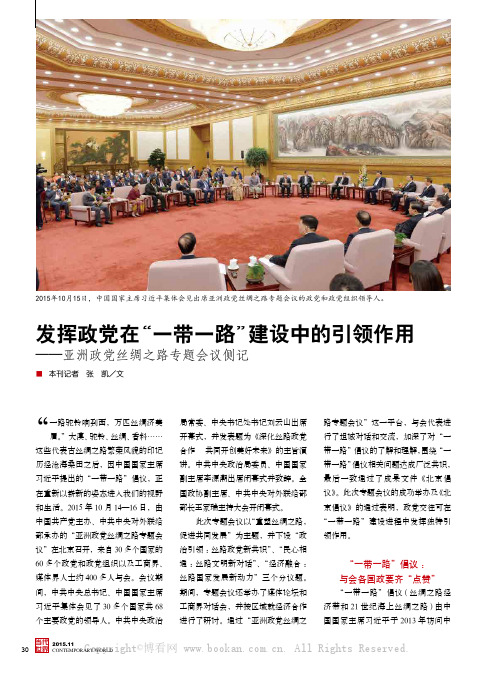非洲司司长卢沙野接受
- 格式:doc
- 大小:70.00 KB
- 文档页数:20

中华人民共和国和卢旺达共和国关于共同推动落实三大全球倡议的联合声明文章属性•【缔约国】卢旺达•【条约领域】政治,外交,经济,文化教育•【公布日期】2024.09.05•【条约类别】声明/宣言•【签订地点】北京正文中华人民共和国和卢旺达共和国关于共同推动落实三大全球倡议的联合声明应中华人民共和国主席习近平邀请,2024年9月3日至5日,卢旺达共和国总统保罗·卡加梅赴华出席新一届中非合作论坛北京峰会。
其间,两国元首在亲切友好气氛中举行会谈,就双边关系及共同关心的地区和国际问题进行了富有成效的交流,特别是就三大全球倡议深入交换意见,共同决定将双边关系提升为全面战略伙伴关系。
双方一致认为,中卢建交50多年来,两国传统友谊历久弥坚,政治互信持续增强,务实合作成果丰硕,在国际事务中密切配合,有力造福两国和两国人民。
双方高度评价卡加梅总统2017年对华国事访问和习近平主席2018年对卢国事访问以来两国关系取得的新发展,对两国政治上相互支持、经济上合作共赢表示满意。
一、面对全球挑战,双方一致同意携手构建人类命运共同体,倡导建设持久和平、普遍安全、共同繁荣、开放包容、清洁美丽的世界,支持建设平等有序的世界多极化和普惠包容的经济全球化。
卢方高度赞赏并积极支持习近平主席提出的全球发展倡议、全球安全倡议和全球文明倡议,认为三大全球倡议为全球南方发展提供新机遇,为国际社会进步描绘新愿景,愿同中方共同落实相关倡议。
双方一致同意在和平共处五项原则基础上加强全面合作。
双方强调,在涉及彼此核心利益和重大关切问题上相互支持是中卢关系的基石,重申反对外部势力干涉对方内政,承诺支持对方走符合本国国情的独立发展道路。
中方重申坚定支持卢方维护民族团结。
卢方重申坚定奉行一个中国原则,承认世界上只有一个中国,台湾是中国领土不可分割的一部分,中华人民共和国政府是代表全中国的唯一合法政府,支持中国政府为实现国家统一所作的一切努力,认为中国同任何国家一样,有权自主处理其内部主权事务。

江西省九师联考2024-2025学年高三上开学考试语文试题一、现代文阅读(35分)(一)现代文阅读I(本题共5小题,19分)阅读下面的文字,完成1~5题。
材料一:① ______________________________高温是夏季常见的天气现象,当日最高气温超过35℃时即可定义为高温天气,而连续多日的高温则构成高温热浪。
在过去的两年中,我国都度过了热浪袭人的夏季,如2022年夏季,全国平均气温为1961年以来历史同期最高点,2023年夏季次之。
更需注意的是,2023年首个高温橙色预警发布于6月22日18时,2022年则是在6月17日18时。
2024年的高温橙色预警,比前些年来得更早,甚至更加猛烈。
② ______________________________极端高温天气不仅出现在我国,其他地方的高温同样来得更早更强,这几乎波及到北半球所有地区。
今年6月初,美国西南部多州最高气温超过38℃,美国亚利桑那州首府凤凰城6日最高气温达45℃,内华达州拉斯维加斯7日最高温达48.3℃,均创历史纪录,且高温出现时间比往年早约两周。
极端高温不但直接危及人体健康,还会加剧干旱、引发山火,给农业生产和城市供电系统带来冲击,严重影响国民经济发展和社会的正常运行。
5月下旬,巴基斯坦许多城市面临热浪天气,一些地方的气温接近50℃,该国采取紧急措施,一半学生停课一周以减轻热浪的影响。
③ ______________________________极端高温频发,特殊天气形势的影响是重要因素。
一般而言,高温天气多与大气高压系统密切相关。
当强大的高压系统滞留时,会形成持续性晴好天气,使得高温持续。
常见的高压系统为副热带高压和中纬度西风带上的阻塞高压。
例如,今年5月下旬至6月初,强大的副热带高压系统笼罩了印度次大陆,也影响到了东南亚。
④ ______________________________每一次极端高温虽有其特定的天气条件,但世界范围极端高温天气频繁出现,很明显地构成了全球气候变暖的趋势。

2023年全国新高考一卷语文真题及参考答案一、现代文阅读(35分)(一)现代文阅读I(本题共5小题,19分)阅读下面的文字,完成1~5题。
对素食者和肠胃疾病患者来说,藜麦的发现是一个奇迹。
藜麦不含麸质,富含镁和铁,比其他种子含有更多的蛋白质,包括人体无法独自生成的必需的氨基酸。
美国宇航局宣布,藜麦是地球上营养最均衡的食物之一,是宇航员的理想之选。
产于安第斯山的藜麦有一个令西方消费者神往的传说:印加人非常重视藜麦,认为它是神圣的,并且称之为“万谷之母”。
不过,藜麦的爱好者却通过媒体发现了一个令人不安的事实。
从2006年到2013年,玻利维亚和秘鲁的藜麦价格上涨了两倍。
2011年,《独立报》称,玻利维亚的藜麦消费量“5年间下降了34%,当地家庭已经吃不起这种主食了,它已经变成了奢侈品”。
《纽约时报》援引研究报告称,藜麦种植区的儿童营养不良率正在上升。
2013年,《卫报》用煽动性标题提升了人们对这个问题的关注度:“素食者的肚子能装下藜麦令人反胃的事实吗?”该报道称,贫穷的玻利维亚人和秘鲁人正在食用更加便宜的“进口垃圾食品”。
《独立报》2013年一篇报道的标题是“藜麦:对你有利——对玻利维亚人有害”。
这些消息传遍了全球,在健康饮食者之中引发了一场良心危机。
在社交媒体、素食博客和健康饮食论坛上,人们开始询问食用藜麦是否合适。
这种说法看似可信,被许多人认可,但是经济学家马克·贝勒马尔等人对此则持保留意见。
毕竟,藜麦贸易使大量外国资金涌入玻利维亚和秘鲁,其中许多资金进入了南美最贫穷的地区。
记为经济学家跟踪了秘鲁家庭支出的调查数据,将种植且食用藜麦的家庭、食用但不种植藜麦的家庭和从不接触藜麦的家庭划分为三个小组。
他们发现,从2004年到2013年,三个小组的生活水平都上升了,其中藜麦种植户家庭支出的增长速度是最快的。
农民们正在变富,他们将这种新收入转化为支出又给周边民众带来了好处。
那么藜麦消费量下降34%又是怎么回事呢?原来,在很长的时间内两个国家的藜麦消费量一直在缓慢而稳定地下降,这意味着消费量的下降和价格的激增不存在明显的联系。

“一路驼铃响到西,万匹丝绸济美眉。
”大漠、驼铃、丝绸、香料……这些代表古丝绸之路繁荣风貌的印记历经沧海桑田之后,因中国国家主席习近平提出的“一带一路”倡议,正在重新以崭新的姿态进入我们的视野和生活。
2015年10月14—16日,由中国共产党主办、中共中央对外联络部承办的“亚洲政党丝绸之路专题会议”在北京召开,来自30多个国家的60多个政党和政党组织以及工商界、媒体界人士约400多人与会。
会议期间,中共中央总书记、中国国家主席习近平集体会见了30多个国家共68个主要政党的领导人。
中共中央政治发挥政党在“一带一路”建设中的引领作用——亚洲政党丝绸之路专题会议侧记■ 本刊记者 张 凯/文局常委、中央书记处书记刘云山出席开幕式,并发表题为《深化丝路政党合作 共同开创美好未来》的主旨演讲。
中共中央政治局委员、中国国家副主席李源潮出席闭幕式并致辞。
全国政协副主席、中共中央对外联络部部长王家瑞主持大会开闭幕式。
此次专题会议以“重塑丝绸之路,促进共同发展”为主题,并下设“政治引领:丝路政党新共识”、“民心相通:丝路文明新对话”、“经济融合:丝路国家发展新动力”三个分议题。
期间,专题会议还举办了媒体论坛和工商界对话会,并按区域就经济合作进行了研讨。
通过“亚洲政党丝绸之路专题会议”这一平台,与会代表进行了坦诚对话和交流,加深了对“一带一路”倡议的了解和理解,围绕“一带一路”倡议相关问题达成广泛共识,最后一致通过了成果文件《北京倡议》。
此次专题会议的成功举办及《北京倡议》的通过表明,政党交往可在“一带一路”建设进程中发挥独特引领作用。
“一带一路”倡议:与会各国政要齐“点赞”“一带一路”倡议(丝绸之路经济带和21世纪海上丝绸之路)由中国国家主席习近平于2013年访问中2015年10月15日,中国国家主席习近平集体会见出席亚洲政党丝绸之路专题会议的政党和政党组织领导人。
亚和东南亚国家时提出。
倡议一经提出,便得到国际社会的广泛关注和积极响应。

《包身工》同步练习一、论述类文本阅读阅读下面的文字,回答后面的问题。
一个6岁儿童眼中的非洲劳工世界沙伦·拉弗拉尼尔非洲童工的悲惨世界清晨5点。
沃尔塔湖上一片黑暗,马克·夸杜沃就被从睡梦中唤醒,起身离开他潮湿、肮脏的地板上的睡铺。
开工时间到了。
还打着寒战的马克帮着一艘独木舟划到湖中。
在接下来的5小时里,他的工友一寸一寸地收渔网,马克则把船里的水舀出去,以免船沉没。
马克还没吃早饭,破败的船桨是那么沉重,他几乎抬不起来,但他还是全神贯注地听从坐在独木舟尾的塔基·夸杜沃发出的每个命令。
塔基31岁,体格健壮,稍有不满便对马克拳脚相向。
“我不喜欢这工作。
”马克小声嘟嚷着。
马克·夸杜沃今年6岁,约30磅重,穿着蓝红相间的短裤和印有小美人鱼的T恤衫,看起来更像是一个蹒跚学步的婴儿而不像是一个船工。
他还太小,不明白自己为什么要经过两天的长途跋涉来到这个渔村。
但其他三个较为年长的男孩知道其中原委。
和马克一样,他们都是契约雇佣工。
他们的父母为了区区20美元的年薪把他们租给了塔基。
他们就好像困在渔网里面的鱼儿,直到三年或四年劳役结束后,才能重获自由。
现在他们被迫每周工作7天,每天14小时以上,而他们的工作甚至在成年渔民看来也是相当辛苦的,而且有时还很危险。
童工缩影塔基雇的男孩是从小型流动工人营地里招来的,都是一些上不起学、达不到温饱且没有自由的孩子。
他们只是那些在西非和中非渔场、采石场、可可与水稻种植园或是街市上工作的无数非洲童工的缩影。
女孩子做家佣或在面包房里工作;男孩子则在农田里做工,搬运货物或在废弃的金矿和宝石矿里拾荒。
贩卖儿童绝不是非洲独有的现象。
在中东,儿童被迫赶骆驼、纺织地毯,工厂里也充斥着未成年人。
国际劳工组织估计,每年大约有120万儿童通过非法交易被贩卖、奴役,年交易额达100亿美元。
研究显示,亚洲、拉丁美洲和非洲的儿童最容易遭到贩卖和奴役。
2001年,在贝宁的一个港口,警方在一艘船上发现了35名儿童。

最新国际法案例分析一、2000年4月11日,比利时布鲁塞尔初审法院的一位调查法官针对时任冈吐果民主共和国(以下简称刚果(金))外交部长的耶罗迪亚(Yerodia)签发了一项国际逮捕令,指控他在刚果(金)单独或协同他人实施了战争罪和反人道罪。
该逮捕令通过国际刑警组织向全世界发出,要求相关国家拘留并引渡给比利时以便追究其刑事责任。
比利时发布逮捕令的依据是比利时国内法以及对战争罪和反人道罪的普遍管辖权。
2000年10月17日,刚果(金)向国际法院提起诉讼,称比利时违反了根据国际法对刚果(金)负有的国际义务,要求法院宣布比利时应当撤销其发布的逮捕令。
2002年2月14日,国际法院作出判决:比利时签发国际逮捕令并请求国际协助的行为侵犯了刚果(金)在任外交部长享有的豁免权和不可侵犯权,比利时必须通过自己选择的方式撤销2000年4月11目的逮捕令。
(1)普遍管辖权的含义是什么?(2)普遍管辖权问题主要涉及哪些犯罪行为?答:(1)普遍管辖权是指根据国际法的规定,对于严重危害国际和平与安全以及全人类利益的某些特定的国际犯罪行为,各国均有管辖权,而不问这些犯罪行为发生的地点和罪犯的国籍。
(2)至于哪些犯罪是各国有普遍管辖权的,在国际法上没有明确的规定,已获得明确公认的此类犯罪有:公海上的海盗行为、奴隶贸易和战争罪等。
其他的国际犯罪行为,如灭绝种族罪、空中劫持、贩卖和走私毒品、危害人类罪等,也被较多的国家和学者认为是各国有普遍管辖权的犯罪。
二、中新网2007年11月1日电:共同社消息,拥有伊朗和日本双重国籍的职棒日本火腿队投手达比修有(Darvish Yu,21岁)日前选择了日本国籍。
据其父证实,达比修有已向大阪羽曳野市政府机关提交了所需的文件已得到了受理。
至此,达比修有代表日本出征北京奥运的障碍已全部扫清。
达比修有的父亲拥有伊朗国籍,母亲拥有日本国籍。
根据日本的《国籍法》,公民在满22岁之前必须消除双重国籍的身份,由于达比修有将在北京奥运期间迎来22岁的生日,因此他必须就国籍作出选择。
金融时报:“非洲”应被丢进垃圾箱参考消息网11月6日报道英国《金融时报》网站11月2日发表题为《非洲?没有这个地方》的署名文章,作者英国作家西蒙·库珀在文章中称,一个从政者的无心之语有时能够揭示他的世界观。
有一天晚上在约翰内斯堡,南非总统雅各布·祖马正在为收费公路辩护。
他说,收费公路是全球惯例,并接着说:“我们大体上不能像非洲的非洲人那样思考。
(听众笑)我们是在约翰内斯堡。
这里是约翰内斯堡。
这可不是马拉维的某条国道。
(笑声)”祖马所在的政党自称为非洲人国民大会,但他对非洲大陆其他国家的明显蔑视说明了一个事实:“非洲”这个词已经失去了原来的意义,应当被丢入垃圾箱。
非洲已经严重分化文章称,作者1969年在乌干达出生时,提起“非洲”这个词仍然是有意义的。
确实,非洲大陆的多样性达到令人难以想像的地步,但在由白人管理的非洲南端以北,绝大多数非洲国家拥有一些共同的基本经历:刚刚摆脱殖民统治,主要依靠农业,贫穷,而且正在走向独裁统治。
对那一代人而言,殖民主义的垮台提供了一条横跨非洲大陆的真正纽带。
尽管如此,大约从2000年开始,非洲国家的经历出现了截然不同的分化,这使得谈起“非洲”一词几乎不再具有意义。
“非洲”的概念来自非洲之外,始于(古希腊历史学家)希罗多德。
最具影响力的非洲泛非主义者克瓦米·恩克鲁玛受到了W·E·B·杜波依斯和马库斯·贾维等美国和加勒比黑人思想家的启发。
“非洲”之所以作为一个标签,是因为这个大陆得到的全球关注很少达到足以将其更加细致地划分进行讨论的程度。
在通常情况下,讲英语的外人用一句话便概括了整个非洲大陆:(时任英国首相)哈罗德·麦克米伦在1960年发表的《变革之风》演讲,(爱尔兰歌手)鲍勃·格尔多夫1984年的歌曲《他们知道现在是圣诞节吗?》,以及英国《经济学家》杂志在2000年发表的封面文章《绝望的大陆》。
联合国官员:刚果(金)3000余难民到乌干达避难
> 联合国难民事务高级专员公署(难民署)9日称,为躲避武装冲突,3000余名刚果
(金)难民越境到邻国乌干达避难。 联合国难民署发言人爱德华兹当天在日内瓦举行的
例行记者会上说,到乌干达避难的刚果(金)难民多来自北基伍省鲁丘鲁地区的农民,这些
难民告诉难民署,武装冲突各方在当地进行绑架、强奸,他们不得已越境到乌干达西南部的
基索罗地区寻求避难。 爱德华兹说,难民署在基索罗地区的尼亚卡邦代设置了难民中转
中心,可暂时容纳1000名难民,并为这些难民提供帐篷、热食、饮用水和基本医疗服务。
今年年初,盘踞在刚果(金)东部地区的卢旺达胡图族武装“卢旺达解放民主力量”、当地民
间武装和刚政府军在刚东部地区展开混战,造成大量平民流离失所。 (记者王昭吴陈)
本文地址:www.bainuopv.com 磁力泵 屏蔽泵 化工泵 管道泵 离心泵 排污泵 隔膜泵 自吸
泵
2023年高考语文新课标全国Ⅰ卷+答案解析(试题部分)一、现代文阅读(35分)(一)现代文阅读I(本题共5小题,19分)阅读下面的文字,完成下面小题。
对素食者和肠胃疾病患者来说,藜麦的发现是一个奇迹。
藜麦不含麸质,富含镁和铁,比其他种子含有更多的蛋白质,包括人体无法独自生成的必需的氨基酸。
美国宇航局宣布,藜麦是地球上营养最均衡的食物之一,是宇航员的理想之选。
产于安第斯山的藜麦有一个令西方消费者神往的传说:印加人非常重视藜麦,认为它是神圣的,并且称之为“万谷之母”。
不过,藜麦的爱好者却通过媒体发现了一个令人不安的事实。
从2006年到2013年,玻利维亚和秘鲁的藜麦价格上涨了两倍。
2011年,《独立报》称,玻利维亚的藜麦消费量“5年间下降了34%,当地家庭已经吃不起这种主食了,它已经变成了奢侈品”。
《纽约时报》援引研究报告称,藜麦种植区的儿童营养不良率正在上升。
2013年,《卫报》用煽动性标题提升了人们对这个问题的关注度:“素食者的肚子能装下藜麦令人反胃的事实吗?”该报称,贫穷的玻利维亚人和秘鲁人正在食用更加便宜的“进口垃圾食品”。
《独立报》2013年一篇报道的标题是“藜麦:对你有利--对玻利维亚人有害”。
这些消息传遍了全球,在健康饮食者之中引发了一场良心危机。
在社交媒体、素食博客和健康饮食论坛上,人们开始询问食用藜麦是否合适。
这种说法看似可信,被许多人认可,但是经济学家马克·贝勒马尔等人对此则持保留意见。
毕竟,藜麦贸易使大量外国资金涌入玻利维亚和秘鲁,其中许多资金进入了南美最贫穷的地区。
几位经济学家跟踪了秘鲁家庭支出的调查数据,将种植且食用藜麦的家庭、食用但不种植藜麦的家庭和从不接触藜麦的家庭划分为三个小组。
他们发现,从2004年到2013年,三个小组的生活水平都上升了,其中藜麦种植户家庭支出的增长速度是最快的。
农民们正在变富,他们将这种新收入转化为支出又给周边民众带来了好处。
那么藜麦消费量下降34%又是怎么回事呢?原来,在很长的时间内两个国家的藜麦消费量一直在缓慢而稳定地下降,这意味着消费量的下降和价格的激增不存在明显的联系。
非洲司司长卢沙野接受《时代》周刊记者采访实录2010/09/199月17日,外交部非洲司司长卢沙野接受了《时代》周刊驻京分社社长毕菡娜的采访。
全文如下:记者:中华人民共和国自成立以来,就与非洲国家有着长期友好的关系,特别是最近几年这种关系得到了进一步的巩固和深化,我想听听您对这种关系的看法。
卢:中国同非洲的关系应该说有相当长的历史了。
从新中国成立,以及绝大多数非洲国家独立以后,我们双方就建立起了友好的交往与合作关系。
我想可以从四个角度全面审视中非关系:首先,中非关系的历史性。
我们要有历史的眼光,中非关系不是始于今日。
当前很多国家很关注中非关系,但在他们眼里中非关系似乎只是近10年的事,但实际上中非关系至少已有半个多世纪了。
今天中非关系的发展是立足于中非传统友谊的基础上的。
如果不了解中非关系的历史,就不能了解中非关系的现实。
中国和非洲国家过去都曾遭受过殖民主义的侵略和奴役,有着相似的历史遭遇,解放后和独立后又都面临着共同的发展任务。
所以中国和非洲应该说有着天然的友好感情。
所以,中国在上世纪50-70年代,同非洲开展的友好合作都是非常无私和真诚的。
我们在非洲国家争取民族独立和解放的过程中向它们提供了很大的支持;在它们独立之后也提供了很多的经济援助,帮助他们建立国民经济体系。
在这个过程中实际上中国没有要求任何经济回报。
中国没有从非洲国家拿一滴石油,没有从非洲国家开采一吨矿石。
现在很多国家觉得中国在非洲的存在很突出,实际上那个时候中国就已经在非洲存在了,中国在70年代初在非洲就建设了1800公里长的坦赞铁路。
这么大一个项目在今天也算是举世瞩目了。
只不过可能当时中国的发展还不是那么突出,国际上还没有太多的人注意到中国,所以对于中国在非洲做的事情也没有人去关注。
刚才我说,中非之间有天然的友好感情。
其实这种帮助是相互的。
中国向非洲提供了支持,反过来非洲也支持了中国,如1971年中国恢复在联合国的合法席位,就得到了非洲国家的大力支持。
中非关系的第二个特点就是道义性。
中非之间的合作,中国向非洲国家提供援助,实际是履行中国作为一个发展中的大国对于国际社会的责任。
我们常说没有非洲的发展,就没有世界的繁荣,所以帮助非洲发展是国际社会的共同责任。
中国同非洲的合作首先是发展中国家之间的互帮互助,是南南合作的一个重要的体现。
记者:您刚才提到帮助非洲是国际社会的共同责任。
我们也注意到在冷战后由于美国和前苏联实力下降,他们对非洲提供的经济援助也下降了。
这是否给了中国一个机会加大对非投资。
还是说仅仅因为中国变得越来越富裕了,口袋里有更多的钱去帮助非洲国家呢?卢:你说的这两点都有点道理,这是一个时代机遇的问题。
冷战结束之后,苏联解体,美国总体上对非洲的关注减少,对非洲的投入也减少了。
这个时候正好是中国发展比较快的时期。
因此,这里既有发达国家对非洲投入减少的因素,又有中国由于经济发展加速,实力增强,有更多的能力、资金和手段来帮助非洲的因素。
这两个因素碰到了一块,可以说是一个历史的巧合。
所以我刚才讲这是中国作为一个发展中大国对国际社会的责任。
也就是说,我们既是一个发展中国家,又是一个大国。
我们不仅履行的是发展中国家之间的互帮互助的责任,也履行作为一个世界性大国对非洲这些发展中国家的责任。
中国的开国领袖毛泽东主席曾说过,中华民族应当为人类做出更大的贡献。
那么现在中国帮助非洲,就是在为全人类做贡献。
中非关系的第三个特点就是全面性。
现在外界关注中非关系更多的是关注中非经贸关系,这没有错,但中非关系不仅是经贸关系。
的确,最近10年中非经贸合作发展确实很快,比如说中非贸易额10年中增加了10倍。
但实际上中国和非洲还在其他更广泛的领域开展了很多合作,比如说同非洲国家加强政治交往,增进政治互信,我们在国际事务上加强协调沟通、相互支持,特别是在应对国际金融危机,应对气候变化的挑战,应对粮食安全,以及处理非洲的地区和平与安全问题上,中非都进行了很好的合作。
我可以举个例子,现在联合国在非洲开展的所有维和行动中国都参加了。
中国是联合国安理会5个常任理事国中,向联合国在非维和行动派驻维护人员最多的国家。
另外,我们对非洲地区组织自主调解非洲地区冲突的努力给予了政治上、道义上、物资上的支持。
比如我们向非盟在索马里和苏丹的维和行动提供了物资援助。
中国政府还任命了中国政府非洲事务特别代表,积极参与非洲地区问题的调解、斡旋和解决,支持非洲国家和地区组织谋求非洲和平与安全的努力。
除了经贸之外,我们还在社会发展领域开展了广泛合作。
我不知道你是否了解中非之间有一个对话和合作的机制叫中非合作论坛。
这个论坛是2000年成立,每三年开一次会。
每次开会中国政府都会提出一系列对非务实合作的举措。
这些举措的很大一部分都涉及到非洲的社会民生。
我可以给你说几个数字,以使你有个直观的了解。
在2009年11月召开的中非合作论坛第四届部长级会议上,温家宝总理宣布了8项对非合作举措。
当然这其中有很多经贸合作举措,也很重要,我可以不说。
我只列举社会民生方面的一些数字。
比如在农业合作方面,我们在非洲的农业技术推广中心将增加到20个,3年之内向非洲派50个农业技术工作组。
为了支持非洲国家的教育事业,今后3年我们将为非洲建50座学校。
为了帮助非洲国家应对气候变化的挑战,我们将在今后3年为非洲建设100个清洁能源项目,包括太阳能、沼气、小水电等。
为了帮助非洲发展科学技术事业,今后3年我们将同非洲国家开展100个科研项目合作。
在人员培训方面,今后三年我们将邀请100名非洲的博士后到中国参与工作,给非洲国家培训200名公共管理硕士、1500名中学校长和教师、2000名农业技术人员、3000名医生护士和医疗管理人员,每年向非洲国家提供5500个来华留学奖学金名额。
我们可以看出中非的合作非常广泛,我们的目的也是帮助非洲国家改善民生,实现发展。
中非关系的第四个特点是可持续性。
这反映在三个方面:一是中非合作的真诚与平等性。
我们始终同非洲国家平等相待,从来不对他们指手画脚,不当教师爷,也不会把自己的意识形态和政治体制强加给他们,跟他们的合作也不附加什么条件。
我们也不会拿援助来作为干涉他国内政的一个工具。
所以非洲国家和中国打交道时,觉得很轻松,没有受压抑受歧视的感觉。
这就是为什么几十年来中非关系持续健康发展的原因。
二是互惠互利。
中非合作既对非洲有利,当然也对中国有利。
中国向非洲提供了资金、技术、经验,帮助非洲实现发展,帮助他们把资源优势和人力资源的潜在优势转化为实实在在的发展能力。
当然了,中国在合作中也获取了自身发展所需要的资源和市场。
中国在非洲有经济利益这是很正常的。
任何国家在非洲都有自己的利益。
中国在非洲获取利益,实现自己的发展,实际上也使中国有更多的能力和手段来帮助非洲。
所以说,这就是互利共赢。
三是中非合作的务实高效。
现在很多国家特别是西方国家都说中非合作很“务实”,喜欢用PRAGMATIC 这个词。
这个词是说明中国对非合作的举措是实实在在的,而不是说中国对非合作的动机的功利性。
比如,从我刚才介绍的一系列数字就可以看到中国对非合作的实在性。
中国在开展对非合作时,一定是根据非洲国家的切实需要,非洲国家需要什么,我们就给他们做什么。
而且中国一定是根据自己的能力和财力去做。
我们不会去承诺超出我们能力和财力的事情。
我们一旦答应的事情,则一定会实实在在地给他们做好。
“高效”是大家有目共睹的,非洲国家抱怨他们跟国际组织和西方国家谈合作项目,没有5-6年定不下来,而同中国仅需1-2年,具体实施只需2-3年。
我举一个很小的例子:减债。
2000年中非合作论坛第一届部长级会议时,中国政府承诺在今后3年内减免非洲32个最不发达国家和重债穷国欠中国的105亿元人民币的债务。
按当时比价大概折合12-13亿美元。
这对于很多西方国家来说不是大数,但对当时的中国来说很不容易。
在会议召开后的两年之内,中方就完全兑现了承诺。
实际上,减债不是中国的首创。
在上世纪90年代中期国际机构就提出了一个“重债穷国减债计划”,但直到2000年没有一个国家实实在在地受益,因为这里边有个十分复杂的程序。
我说这些不是想贬低别人,抬高自己,只是想说明中非合作的“高效”。
记者:我想对您刚才提到的“可持续性”问题加一个追问,刚才您提到中国向非洲提供经济援助时不附加政治条件,您的意思是其他国家有附加政治条件,是这个意思吗?卢:我有这种感觉。
比如说,很多西方国家总是把民主、人权、良政作为援助的先决条件。
我们中国不提这些,因为我们感觉这是别人的内部事务,别人采取什么方式、什么进程来实现良政是他们自己的事。
我们可以提一些建设性意见,但不可以干涉他们,教他们怎么做。
因为每个国家的情况差异很大,在一个国家行得通的东西,在另一个国家不一定行得通。
各个国家的历史文化传统、国民素质、经济发展水平都制约着民主人权发展进程。
每个国家的人民都是聪明智慧的,他们可以通过同别的民族合作交往,进行比较,知道什么好,什么不好,不需要别人来教。
所以中国在同非洲开展合作时,不附加任何条件,我们认为自己没有资格去教训非洲国家和人民。
记者:在很多年之前,如果我们看到非洲媒体报道,经常会在头版头条看到非洲国家很高兴看到中国对非援助日益增加,而且不附加任何政治条件。
但是如今如果你看他们的媒体报道,至少有一些会说中国对非援助有了倒退,您认为为什么会有这种现象,您认为这种报道正确吗?卢:您讲的中国对非援助倒退是质量上的,还是数量上减少,还是说不如以前那么受欢迎了?记者:应该不是指规模或数量上的。
我看非洲媒体报道,感觉指的是中国虽然提供了一些钱,但只用中国工人,非洲本地获益不大。
卢:我也在琢磨这个问题。
的确,非洲媒体有了一些变化,对中非合作的负面报道好像多起来了。
我在思考是什么原因。
我想可能有三个方面的因素:第一,随着中非合作扩大,项目多了,参与项目的中国工人也就多了。
中国企业为什么带中国工人到非洲做项目?因为很多项目要求比较高的技术水平,时限要求也比较高。
我们引进一部分工人,是为了保证工程的工期和质量。
由于中非合作规模大大扩展,项目多了,中国工人在非洲的数量就显得比较突出。
实际上,无论是中国在非洲的基础设施建设项目还是投资项目,中国工人的比例并不高。
比如说,我在塞内加尔当了3年多大使。
我们在塞内加尔援建的最大项目是国家大剧院。
我在那里的时候,这个项目的中方公司人员(主要是技术工人和工程师)只有五六十人,当地工人则有四五百人。
我们在塞内加尔还有一个渔业合资公司。
该公司只在技术和管理层有20多名中方员工,其他都是当地员工,有1000多人。
我想中国在其他非洲国家的情况大致也是这样。
因为中国在外面的项目多了,别人就感觉中国工人多了,但其实比例很低。
第二,可能跟对非洲当地公司形成竞争有关。